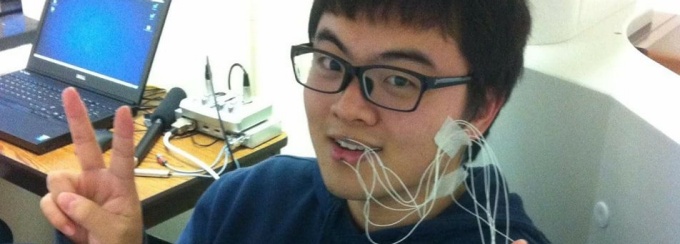Phonetics and Phonology

PhD student Miao Zhang participating in an electromagnetic articulography (EMA) experiment.
Phonetics is the study of the production and perception of speech sounds, and phonology concerns the study of more complex and abstract sound patterns and structures (syllables, intonation, etc.). Several researchers at the Department of Linguistics focus on a range of different types of phonetic and phonological research, including fieldwork, corpus data analysis, experimental phonetics, and articulatory methods.
Core Researchers
Christian DiCanio, PhD is a phonetician and fieldworker by training. His research has focused broadly on the production and perception of tonal and phonation contrasts, corpus phonetics, and vowel production. His current projects include speech production research on the prosody-tone interface in two endangered languages of Mexico (Itunyoso Triqui and Yoloxóchitl Mixtec) and the development of computational methods for analysing the phonetics of spoken endangered language corpora. Both projects are part of his current NSF grant. Collectively, this work examines the extent in which the suprasegmental units of speech organize the production of sounds in human language.
Matthew Faytak, PhD is a phonetician who specializes in articulatory phonetics, especially tongue ultrasound imaging. The theoretical focus of his research is on the connections between low-level biases in speech production and phonetic and phonological structure. He places a high priority on phonetic description and field data collection, particularly languages of Cameroon and China.
Jeff Good, PhD, in addition to a having a general interest morphophonological typology and the phonology-syntax interface, works on the typology of Bantoid tone systems and the phonetics and phonology of tone and accent in Saramaccan, a creole of Suriname.
Karin Michelson, PhD's focus has been in the Northern Iroquoian languages, especially Oneida and Mohawk and particularly in the accent systems, intonational phonology, and boundary phenomena. More recently she worked on a phonetic study of Oneida plosives /t/ and /k/.